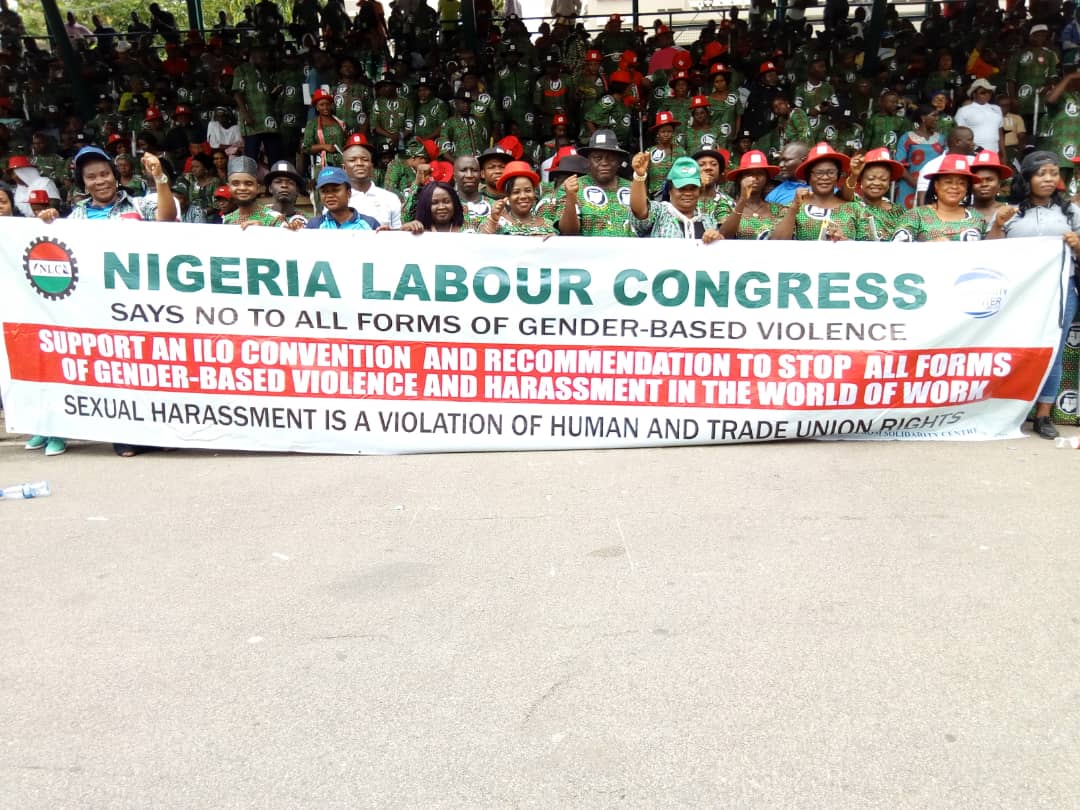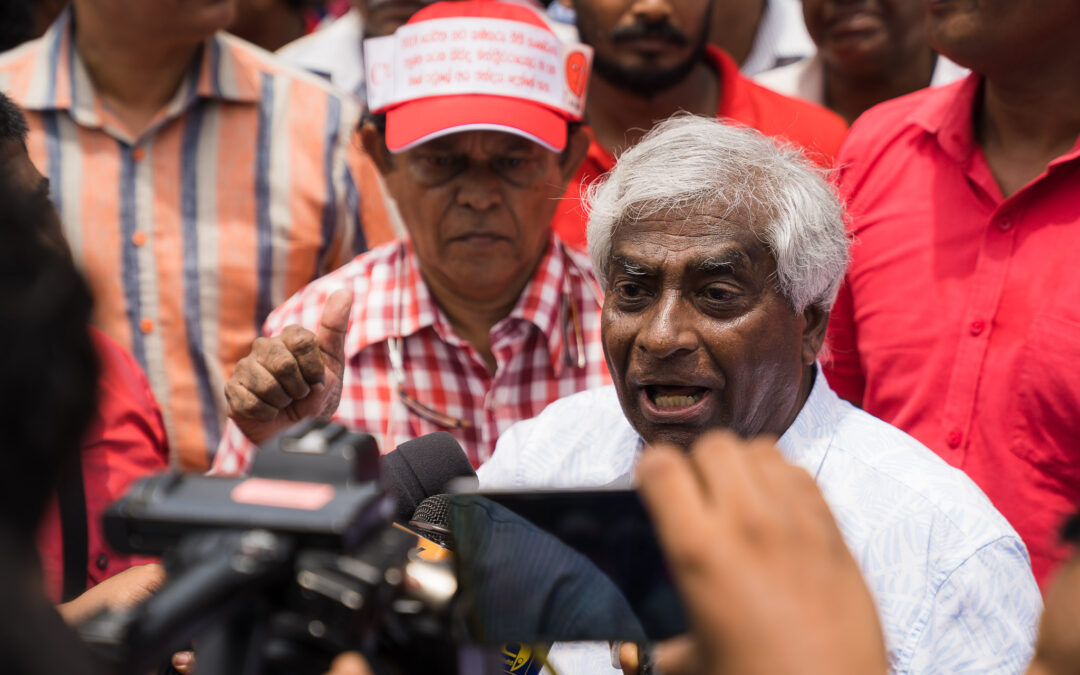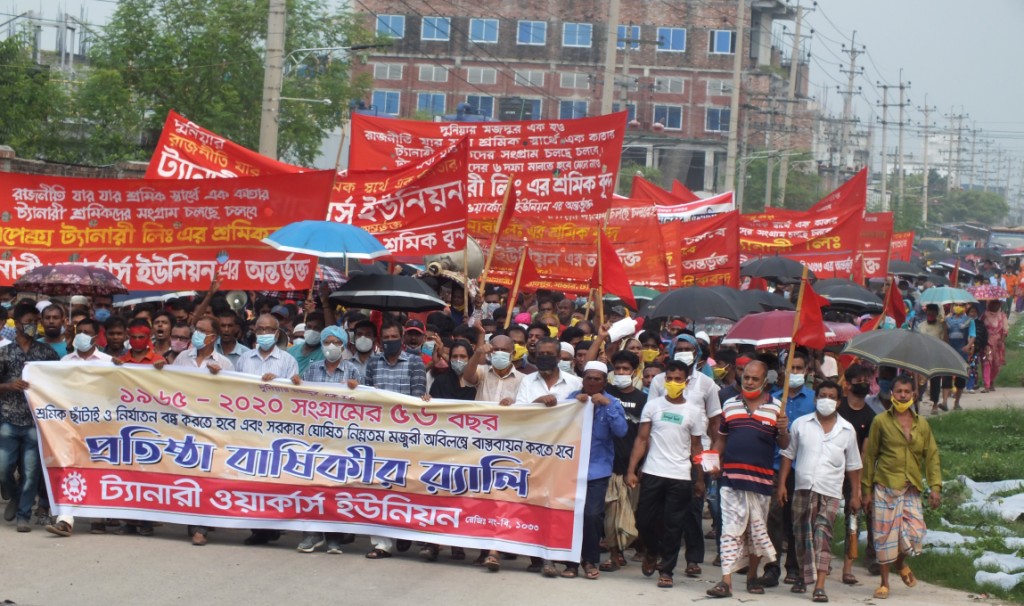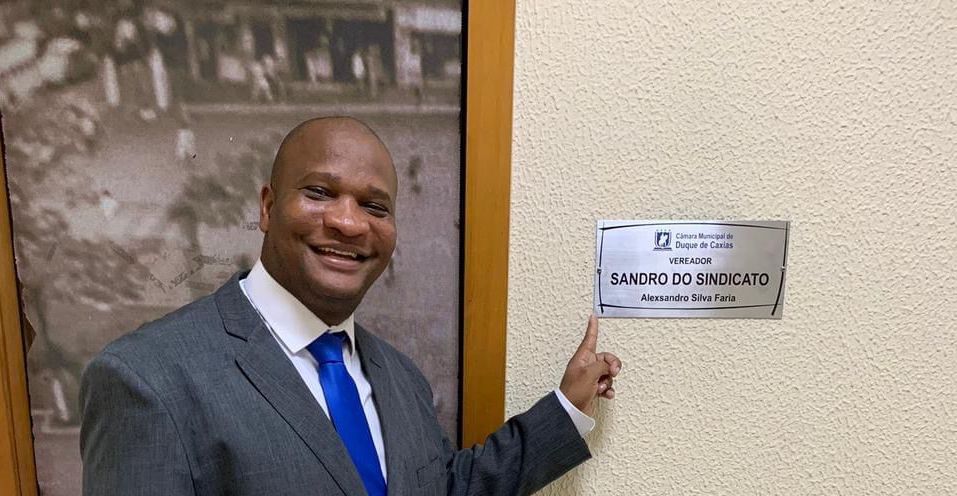
Dec 8, 2021
A new report by the Nigeria Labor Congress (NLC) and the Solidarity Center, “Breaking the Silence: Gender-Based Violence in Nigeria’s World of Work,” finds that gender-based violence and harassment (GVBH) at work is widespread in Nigeria, but goes largely unreported. The report looks at the pervasiveness of GVBH in Nigeria—which boasts Africa’s largest economy, the continent’s biggest trade union movement, and a growing population of 200 million.
A lack of worker-led research about the scope and incidence of GBVH in Nigeria’s world of work, poor implementation and enforcement of laws and workplace policies, entrenched discriminatory gender norms, and an inadequate legal framework hampered civil society and union efforts to address the problem. Moreover, the COVID-19 pandemic has exacerbated these dynamics, exposing many workers, particularly women and other marginalized workers, to an even higher risk of GBVH.
The NLC and the Solidarity Center partnered to address the lack of data on GBVH in the world of work. The NLC established a women and youth structure known as the National Women Commission in September 2003, which works with NLC affiliates and stakeholders to promote gender equality and empower women and youth to take on leadership positions. It facilitates programs that address GBVH at work.
Through this structure, women workers successfully campaigned for the NLC sexual harassment policy. This victory paved the way for women to play a leading role in the adoption of the International Labor Organization (ILO) Convention 190 (C190)—the first global, binding treaty that recognizes the fundamental right to a workplace free from violence and harassment, including GBVH.
Assault In Lagos Market
A recent incident of alleged GBVH shows the importance of this work. Earlier this month, a magistrate court recommended prosecution for a man accused of sexually assaulting a minor in an open market in Lagos. The International Lawyers Assisting Workers (ILAW) network, a project of the Solidarity Center and now the largest global network of workers’ rights lawyers and advocates, is assisting with the case.
The court’s recommendation is a direct result of awareness training with market vendors about their right to GBVH-free workplaces. Following the ILO’s adoption of C190 in 2019, the NLC and the Solidarity Center began training workers to put into practice provisions preventing GBVH. A newly formed GBVH task force in the market brought attention to the alleged assault, leading to a trial in Nigeria’s high court.
Breaking The Silence
The report results from efforts by women workers to provide concrete evidence regarding the scope and incidence of GBVH at work and break the silence to tell their stories of strength and courage.
Women workers identified two locations for study in Abuja and Lagos. Then, they drafted questions and conducted one-on-one interviews with peers. In the first stage—from September 7, 2020, to October 29, 2020—researchers interviewed 425 women. During the second stage—from December 7, 2020, to February 26, 2021—researchers 494 women. In total, women workers interviewed 919 of their peers and captured data across eight sectors, including the informal economy, manufacturing, healthcare, education, construction, media, hospitality and the public sector.
Behind these numbers are women workers like Amina,* an office cleaner who says she was sexually assaulted by a supervisor and was laid off by her employer. Saraya, a market porter, says she experienced groping and inappropriate touching while commuting to and from work and sexual harassment on the job.
Magdalene, a quality inspector at a bottling company, says she was sexually harassed and sexually assaulted by her supervisors. “I find that the joy that comes with going to work every day is no more there,” she said.
Ada has co-owned a bar with her husband. His domestic violence in their marriage extends to her workplace. “I have never reported to anyone. You are the first person I am sharing this with,” she told an interviewer.
An anonymous male youth trader spoke of the need for more training on GBVH. “We need training on GBVH for men in our market,” he said. “I believe that trainings will go a long way in sensitizing men on the negative impact of GBVH on the lives of women and children.”
Regina Otorkpa, who interviewed women workers, says, “GBVH is a monster silently destroying the confidence and future of survivors still struggling to speak out due to fear of society, fear of self and discrimination.
“Having interacted with survivors of the different forms of GBVH in Nigeria’s world of work, it has become important for the Nigerian government to step up and take a bold step towards C190 ratification. I urge women to be brave and courageous to unmask their fears; it is important that we stop the stigmatization; the struggle against GBVH is a collective one for the good of all.”
Findings and Recommendations
The report unveils high rates of GBVH at work, which goes largely unreported. Findings include:
- More than half (57.5 percent) of women workers interviewed said they experienced GBVH in the world of work.
- Nearly 44 percent said their supervisor or superior had said or done something that made them uneasy due to their gender.
- Only 19.6 percent said they reported incidents of GBVH at work.
- More than one-third (35.9 percent) said they rarely received justice even when they reported violations.
- Some 44 percent said they had suffered gender discrimination that affected their career advancement.
- Nearly one-third (28.8 percent) said they were pressured for sexual favors at work and touched in ways that made them uncomfortable.
Based on this research, the NLC’s recommendations for unions, employers and the Nigerian government include:
- Increased education and awareness of GBVH among workers, managers and supervisors, the general public and policymakers, including its root causes and impacts and the responsibility of all workers to end it.
- Ratification and implementation of ILO Convention 190 concerning the elimination of violence and harassment in the world of work, including GBVH.
- Development of workplace policies to address GBVH and gender discrimination, including safe, confidential processes for reporting incidents; transparent processes for investigation of allegations; remedies for workers who experience GBVH; penalties for perpetrators; and changes to how work is organized to address power imbalances and other risk factors for GBVH in the world of work.
- Adoption of national legislation incorporating the definition of GBVH from ILO C190, protecting the entire world of work and covering all workers regardless of contractual status, including workers in the informal economy.
*All names are pseudonyms to protect the identities of women workers.

Nov 15, 2021
The Free Trade Zones and General Services Employees Union (FTZ & GSEU) has become the first union to successfully bargain a collective agreement with a factory in Sri Lanka’s largest free trade zone.
The collective agreement was signed between the union and the factory, Next Manufacturing Limited, on October 22, 2021, less than a year after a trade union branch office of the FTZ & GSEU was set up at the factory.
Speaking on the achievement, Joint Secretary of the Union Anton Marcus, says factory employees joined the union in December 2020, when they launched a strike to demand payment of late bonuses. “We eventually signed a two-year collective agreement with the company with the support of trade unions and civil society organizations in the United Kingdom.”
The agreement is a first for the Katunayake Investment Promotion Zone. Prior to this, only one other factory chain–the Esquel Group, with more than 350 garment factories–had entered into a collective agreement in Sri Lanka. Both agreements were negotiated and signed with the FTZ & GSEU Union.
“Under this collective agreement, we have agreed to discuss not only the terms and conditions that affect employees but also all privileges and demands submitted by the unions from time to time, and training and development programs that workers can enroll in,” says Marcus. “They also agreed to deduct salary dues and credit the union’s account, and to allow a two-hour duty leave per month to hold committee meetings within factory premises and a half-day duty leave to hold general meetings. The union has agreed to provide two noticeboards, a cabinet and a telephone for the two branch buildings, and the first members are allowed to assemble in the workplace if required, either after work or before the commencement of work.”
This landmark victory carries an important message to all those who work in the garment industry. Collective bargaining power and worker rights can be won even in the garment sector.
The FTZ & GSEU are partners of the Solidarity Center.

Oct 25, 2021
Union leaders and labor rights activists are demanding the government of Bangladesh secure jobs for tannery workers before taking punitive action against the industry for its role in environmental pollution.
The demand was made at a discussion following the recommendation of the Standing Committee on Ministry of Environment, Forest and Climate Change to close polluting tanneries in Hemayetpur, located in the Savar area, which is also home to much of the country’s garment sector. The discussion was organized by the Bangladesh Tannery Workers Union and the Solidarity Center.
Tannery Workers Union (TWU) President Abul Kalam Azad emphasized that tannery workers were not responsible for the pollution but would be hardest hit by the action.
“Workers are never responsible for the environmental pollution caused by the tannery industry,” Azad said. “On the contrary, effective measures should be taken to protect the tannery industry and workers by bringing those responsible for the waste management crisis and pollution of the environment due to their negligence and irresponsibility.”
Leather production is one of Bangladesh’s oldest industries, and tanneries employ 92 percent of all leather workers. The country’s leather exports satisfy one-tenth of world demand.
Tannery Waste Harming Communities
The leather industry is also a major polluter. For decades, tanneries in the main industrial site in Dhaka dumped 22,000 cubic meters of toxic waste daily into the Buriganga River, according to the government’s reports. The pollution wiped out aquatic life and forced the city to rely heavily on groundwater for washing and drinking.
In 2017, amid increasing international pressure about toxic environmental and working conditions in tanneries, the Bangladesh government ordered a massive relocation of the industry from Hazaribagh, a Dhaka neighborhood and one of the most polluted places on Earth, to the newly built Tannery Industrial Estate in Hemayetpur—just 14 miles outside of the capital. Of the 220 tanneries at the Dhaka site, 123 completed the move and are currently operating in Savar. The move impacted approximately 25,000 workers and their families.
The new site included a central effluent treatment plant (CETP) and facilities for chrome recovery, water treatment, and sludge treatment. However, the system is not treating all of the sludge and effluents produced by the factories, creating an additional environmental threat.
The local community says the Dhaleshwari River has become “unusable” and “toxic,” for themselves and their livestock, and farmers cannot use the river for irrigation, affecting their livelihoods.
At a recent discussion marking the 57th anniversary of the founding of the Tannery Workers Union, speakers called on the government to take steps to solve the existing problems of the industry and to build an environmentally friendly leather industry.
TWU General Secretary Abdul Maleque spoke of the union’s history. “Tannery Workers’ Union has been beside the workers for the last 57 years with the participation of all workers irrespective of any party affiliation,” said Maleque. “For the last 38 years, the Tannery Workers’ Union has been working to protect the rights and interests of workers by executing bilateral collective bargaining agreements with employers’ associations every two years, which is a unique example in the history of trade unions in Bangladesh. There is no alternative to organizing the workers and building strong workers’ unions to realize their rights.”

Oct 22, 2021
Afro-Brazilian union leader and city councilman Alexsandro Faria was murdered on October 13, 2021. Known as Sandro do Sindicato–or Sandro from the Union–Faria was on his way to a worker assembly when he was shot dead while driving a van in Duque de Caxias, the section of Rio de Janeiro where he lived.
Faria was the third city councilor in Duque to be killed this year. In 2018, Marielle Franco, a progressive Afro-Brazilian and lesbian city councilor representing one of Rio’s poorest districts, was assassinated, leading to global denunciations.
Faria’s union issued the following statement concerning his murder:
SITICOMMM (Union of Workers in Civil Construction, Industrial Assembly, Furniture, Marble and Granite and Wicker), repudiates the cowardly murder of fellow union leader and city councilor Alexsandro Silva Faria, Sandro do Sindicato.
All SITICOMMM leaders are in solidarity with his family and friends and deeply regret the loss of their loved one.
We emphasize the daily struggle of our comrade Sandro in defense of workers, especially in our city of Duque de Caxias, while he was acting as Union Director.
We also highlight his brief role as elected councilor with the support of 3,247 voters. In a short time in office, he was already bringing changes to the entire city, especially to the Pilar neighborhood.
Comrade Sandro is the third city councilor murdered this year in our municipality. These and other crimes need to be elucidated by the police, as they are a serious attack on the rule of law and democracy. These barbaric crimes cannot go unpunished!
Black, humble, who fought tirelessly for the workers, Sandro do Sindicato.
We want an answer! #SandroVive #SandroVive #SandroVive
“This is a huge loss,” says Solidarity Center Brazil Country Program Director Gonzalo Martinez de Vedia. “Sandro was a worker who moved up to lead a union, an Afro-Brazilian whose connections to the grassroots brought him to public office. That his career ended this way and that he is the third not to finish his term in that same position due to murder sends a troubling message to others aspiring to that path who come from similar backgrounds.”
The union is following the investigation into Faria’s murder closely. The International Trade Union Confederation ranks Brazil among the 10 worst countries in the world for worker rights, noting two murders of union leaders in 2020 as one of the drivers of this ranking.
Faria was buried at the Nossa Senhora do Pilar Cemetery, in Duque de Caxias, Thursday, October 14, 2021.




